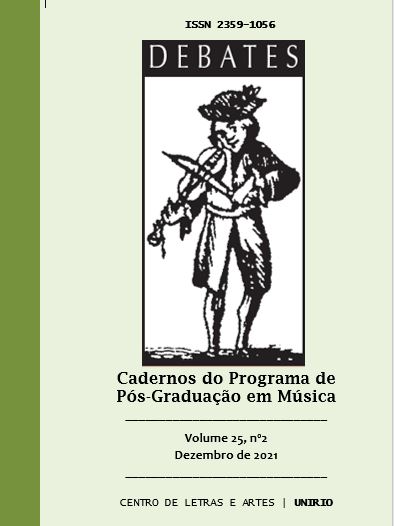Cochichando de Pixinguinha
características, influências e contrastes em três gravações
Palabras clave:
Choro, Etnomusicologia, Análise, Música gravada, Música ao vivoResumen
O presente artigo se propõe a observar as características, as influências e os contrastes em diferentes gravações da música Cochichando, composta por Pixinguinha (Alfredo da Rocha Vianna Filho). Para tanto, optamos por analisar três gravações: a primeira, realizada por Paulinho da Viola em 1976, é parte de um contexto nacional de revitalização do choro; a segunda foi feita em 2004 pelo multi-instrumentista, arranjador e compositor Humberto Araújo e tem como pano de fundo iniciativas voltadas para a expansão e a internacionalização do choro; a terceira gravação, por sua vez, é um registro etnográfico realizado por um dos autores durante pesquisa de campo em 2018 e está inserida em uma recente perspectiva que possui o choro como centro de estudos e debates acadêmicos. Nosso objetivo é compreender possíveis relações entre essas três gravações, identificando de quais maneiras as informações sonoras presentes em duas gravações de estúdio se conectam aos padrões, sonoridades e características da música gravada ao vivo – e cuja gravação é fruto de um contexto etnográfico. Para tanto, utilizamos transcrições e análises musicais, buscando apontar as possíveis relações entre música gravada e música ao vivo.
Descargas
Descargas
Publicado
Cómo citar
Número
Sección
Licencia
Derechos de autor 2022 DEBATES - Cadernos do Programa de Pós-Graduação em Música

Esta obra está bajo una licencia internacional Creative Commons Atribución-NoComercial-CompartirIgual 4.0.


